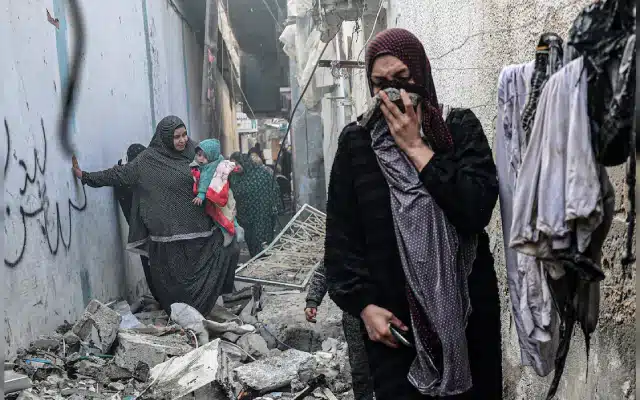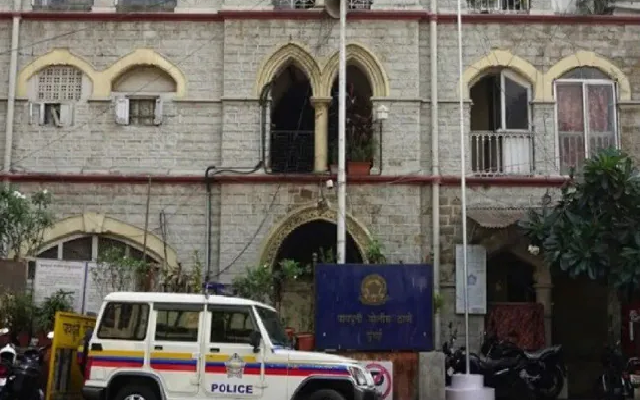Hundreds of Palestinians fled northern Gaza on Sunday due to severe food shortages, while Israel’s war against Hamas continued despite halting efforts to reach a ceasefire and agreement for the release of hostages.
Families in need in the northern part of the besieged conflict zone have been forced to scrounge for food because fighting and looting have prevented relief supplies from being delivered to the severely damaged area.
According to an AFP correspondent, hundreds of people left northern Gaza on Sunday and made their way south, walking through streets littered with trash in between the blackened shells of buildings that had been bombed out.
“I came on foot from north Gaza,” said one of them, Samir Abd Rabbo, 27, who arrived with his one-year-old daughter at the Nuseirat camp in the central Gaza Strip.
“I can’t describe the kind of starvation spreading there.”
Without milk, he said, he had tried to feed his baby girl bread made from animal feed, which she was unable to digest. “Our only hope is God, there is nobody else to help.”
Israeli forces meanwhile kept striking targets across the Palestinian territory and battling Hamas militants in heavy urban combat centred on the southern city of Khan Yunis.
The army said “troops killed a number of terrorists and located weapons” and “apprehended terrorists who had attempted to escape by hiding amongst the civilians”.
Close to the main battlefront, in the far-southern Rafah region, alarm has grown among 1.4 million Palestinians of a looming ground invasion feared to bring more mass civilian casualties.
The war started by the October 7 Hamas attack on southern Israel has ground on well into a fifth month and sent the death count rapidly surging towards 30,000, according to the health ministry in the Hamas-run territory.
Ceasefire talks
Talks have been held for weeks with the goal of reaching a temporary truce, to exchange Hamas’s hostages for Palestinian prisoners held in Israeli jails, and to step up aid deliveries.
US, Arab and other mediators have voiced hope a deal can be reached before the start of the Muslim holy month of Ramadan on March 10 or 11, depending on the lunar calendar.
An Israeli delegation returned Saturday from the latest round of closed-door talks in Paris, also involving Egyptian and Qatari mediators hoping to bridge remaining differences.
Israel’s national security advisor, Tzachi Hanegbi, said “there is probably room to move towards an agreement”.
Media reports suggest both sides are weighing a six-week halt to fighting and the initial exchange of dozens of female, underage and ill hostages for several hundred Palestinian detainees.
Hamas has so far also insisted on a full withdrawal of Israeli forces from Gaza, a demand Netanyahu has dismissed as “delusional”.
An Israeli team will this week head to Qatar for further talks, media reports said, but Israel also ramped up the pressure by warning again that it will eradicate Hamas.
Prime Minister Benjamin Netanyahu said he would convene the cabinet early in the week “to approve the operational plans for action in Rafah, including the evacuation of the civilian population from there”.
“Only a combination of military pressure and firm negotiations will lead to the release of our hostages, the elimination of Hamas and the achievement of all the war’s goals,” he added.
Scavenging for food
Deep worries have been raised by Israeli threats of a ground invasion of Rafah, along with concerns about where the Palestinians who currently reside there would go in the devastated area in case of emergency.
The UN and other relief organizations have issued numerous warnings that “nowhere is safe” in Gaza.
Egypt, which borders Gaza, has refused to allow a large-scale refugee movement, claiming it will not support any Israeli operation to drive out Palestinians.
However, it has also constructed a walled enclosure next to Gaza, as seen by satellite images, ostensibly in preparation for the influx of numerous refugees.
Gaza’s humanitarian crisis has meanwhile spiralled, with the UN World Food Programme reporting “unprecedented levels of desperation”.
Some residents have resorted to eating scavenged scraps of rotten corn, animal fodder, the meat of slaughtered horses, and even leaves from trees.
The health ministry said Saturday that a two-month-old baby named Mahmud Fatuh had died of “malnutrition” in Gaza City.
In northern Gaza’s Jabalia refugee camp, bedraggled children held out plastic containers and cooking pots for what little food was available.
In AFP TV footage, protesters were seen holding signs that read “our children are starving”.
One man said angrily that “we, the grown-ups, can still make it, but these children who are four and five years old, what did they do wrong to sleep hungry and wake up hungry?”
Protests in Tel Aviv
Following Hamas’s historic October 7 attack, which killed roughly 1,160 Israelis, the majority of them civilians, according to an AFP tally of official figures, the war broke out.
About 250 hostages were also taken by Hamas; 130 of them are still in Gaza, 30 of whom are thought to be dead, according to Israel.
The health ministry in Gaza released a new toll on Saturday that shows at least 29,606 people have died as a result of Israel’s retaliatory offensive, the majority of whom were women and children.
Early on Sunday, the ministry announced that an additional 98 people had perished over the course of the previous night, and the Hamas media office reported strikes throughout the entire region.
Inside Israel, public pressure has grown on Netanyahu — both from the desperate families of hostages, and from a resurgent anti-government protest movement.
Thousands again rallied in Tel Aviv’s “Hostages Square” Saturday night to demand swifter action.
“We keep telling you: bring them back to us, and no matter how!” said Avivit Yablonka, 45, whose sister Hanan was kidnapped on October 7.
In the vicinity, demonstrators were obstructing roads and demanding the resignation of Netanyahu’s administration, while law enforcement used water cannons and mounted police to scatter them.
One protester, 54-year-old Moti Kushner, the CEO of a software company, charged, “They are not choosing the right path for us, whether it’s the economy or peace with our neighbors.”
“It looks like they never want to end the war.”
Read More
BSP MP Joins BJP After Lunch with PM Modi

















